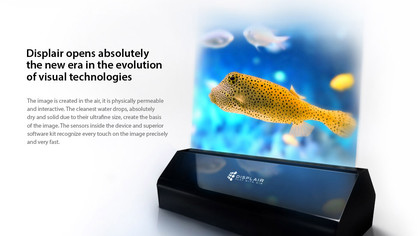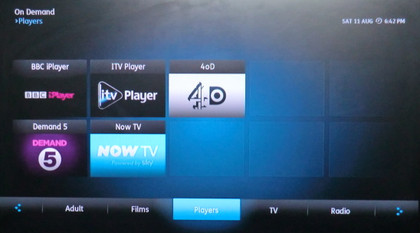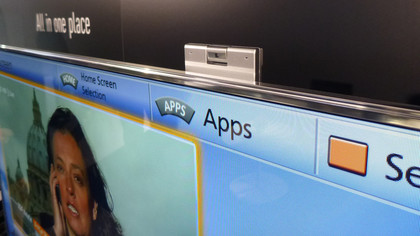The future of TV: water, lasers and voice control
The next big things in TV tech
What is a Water TV?

Is your water HD-ready? OK, so laser TV is just extra-bright projection at close quarters, but water as a display technology is something genuinely new. Ironically debuting at CES in the deserts of the Las Vegas valley in January, Russian company Displair has developed a TV that uses a spray of water as its surface.
From a unit not dissimilar in size to LG's Laser TV, Displair's aqua-based AV idea is actually just as reliant on air as wind and rain; air and light are pushed upwards around a film of water droplets (cloud TV, anyone?) to form a virtual screen that's capable of both high definition images and interactive touchscreen features.
We could be getting misty-eyed about Displair's ideas as soon as this summer, though making this technology affordable will be a matter for trickle-down economics. For now, a waterproof TV from Aquavision is your best bet for the bathroom.
Can I get Sky, Virgin or YouView via a smart TV app?

Say goodbye to the set-top box. It's not happened yet, but how long can it be until subscribing to Sky, BT or Virgin Media is simply a case of firing up an app on a smart TV? It already happens with Sky Player's availability on the Xbox360 and Now TV on YouView, and with Lovefilm and Netflix on virtually all smart TVs the need to subscribe to multiple TV channel-toting contract-based TV deals is fast diminishing.
All that needs to happen now is a partnership between the TV manufacturers and pay TV service providers, a task that would be made much easier if a set of industry-standard protocols was put in place to govern smart TV app development.
Accessing catch-up TV is already cloud-based, so why can't recordings also be stored there, too? Bye bye TiVo, YouView and Sky+HD?
Can I talk to my TV?

Around for a couple of years in embryonic form as Kinect-style clip-on devices, 2013 will see the humble remote control dip in popularity as new smart TVs open their eyes and ears. Panasonic's latest smart TVs have cameras that pop up each time you enter the room, visually identify you using face recognition, and load your own customised home screen. Basic instructions can then be barked into the remote, which stores a microphone.
Get daily insight, inspiration and deals in your inbox
Sign up for breaking news, reviews, opinion, top tech deals, and more.
Similar alternative control comes from Samsung, whose latest TVs have an impressively wide vocabulary for operation and web searching, though navigating by hand gestures is still in its early stages, and not very good yet. Expect these systems to get better every year as microphones become more accurate, numerous and better at knocking out ambient sound, and cameras reach higher resolutions.
Jamie is a freelance tech, travel and space journalist based in the UK. He’s been writing regularly for Techradar since it was launched in 2008 and also writes regularly for Forbes, The Telegraph, the South China Morning Post, Sky & Telescope and the Sky At Night magazine as well as other Future titles T3, Digital Camera World, All About Space and Space.com. He also edits two of his own websites, TravGear.com and WhenIsTheNextEclipse.com that reflect his obsession with travel gear and solar eclipse travel. He is the author of A Stargazing Program For Beginners (Springer, 2015),
